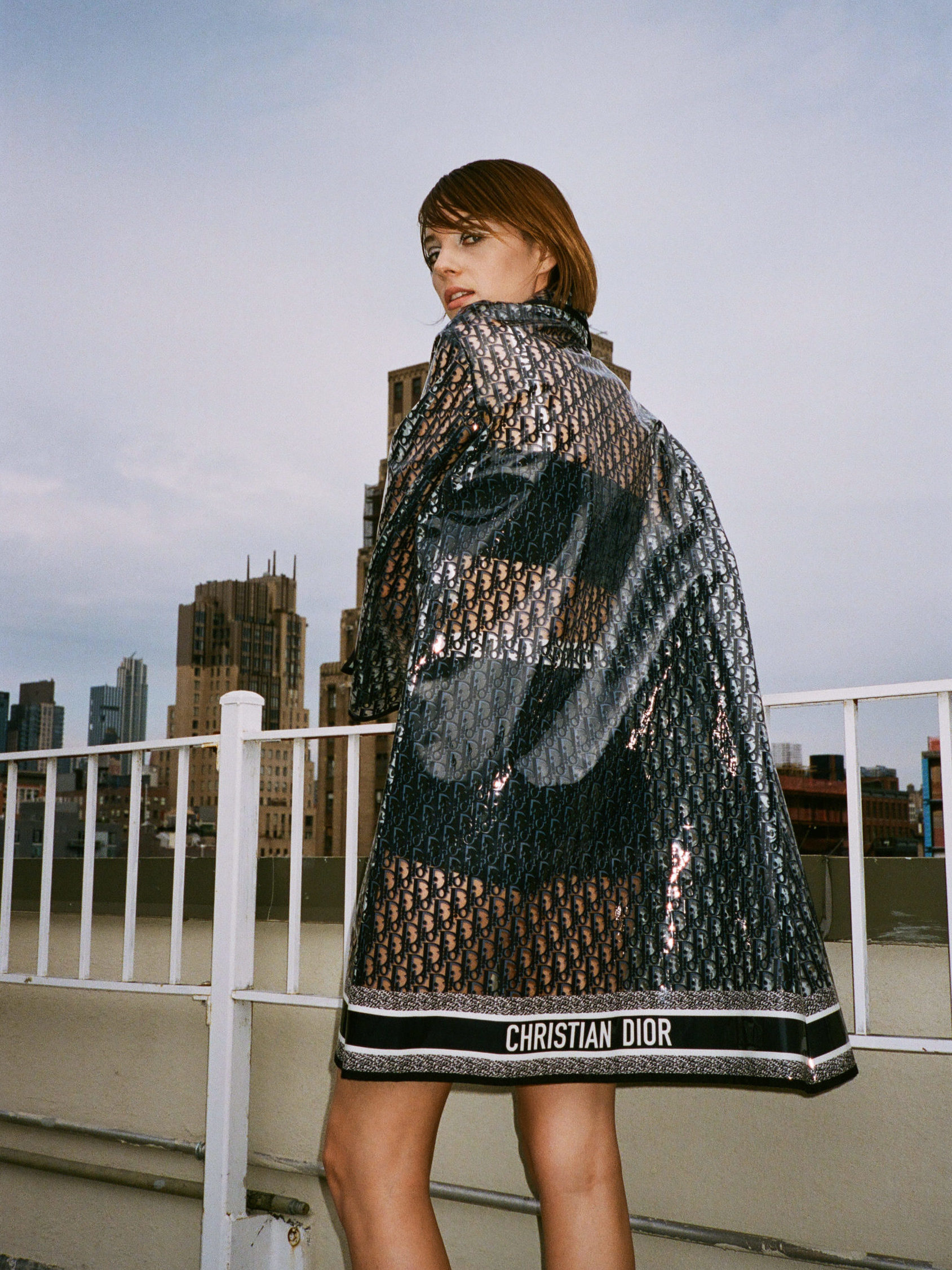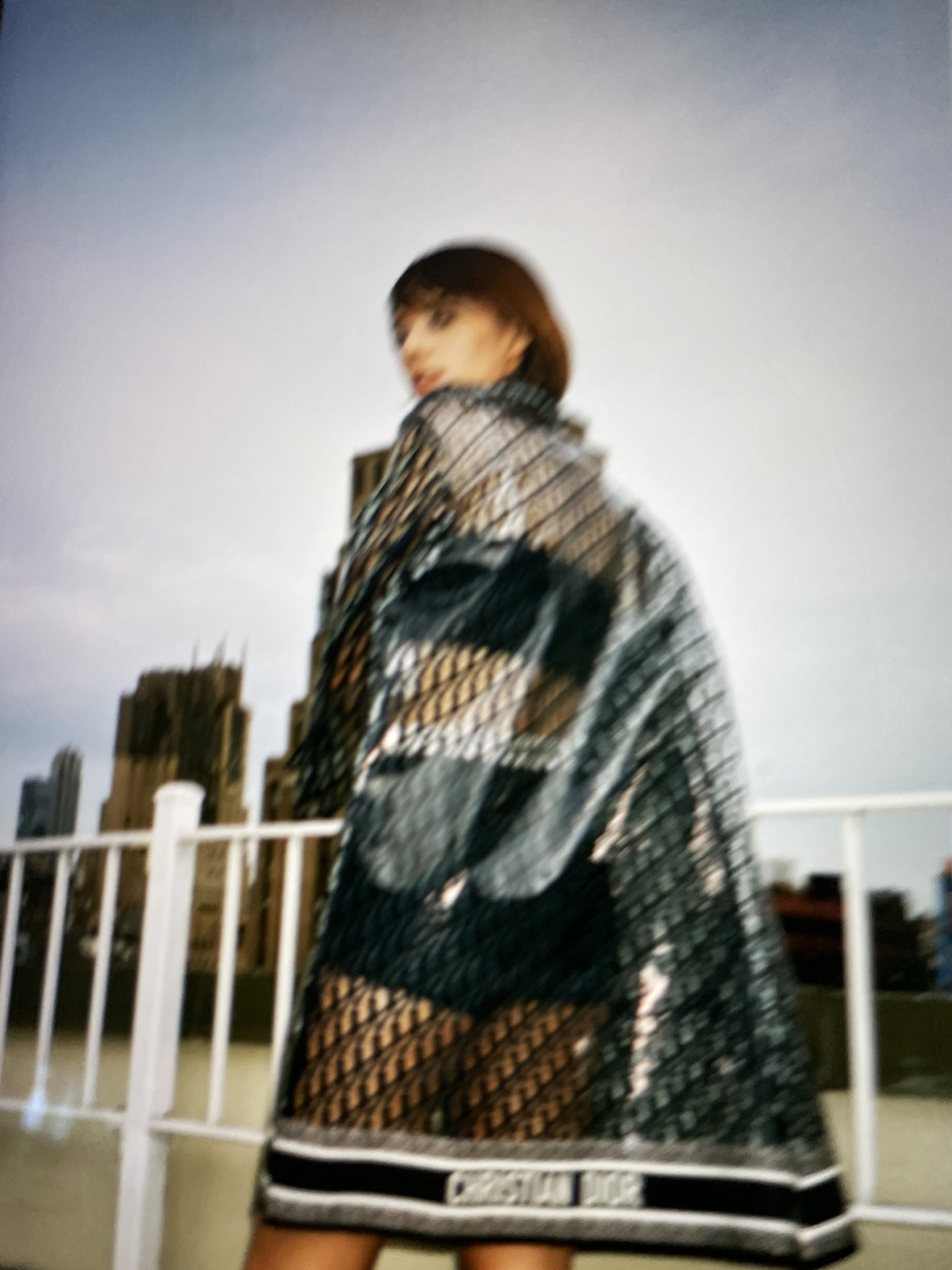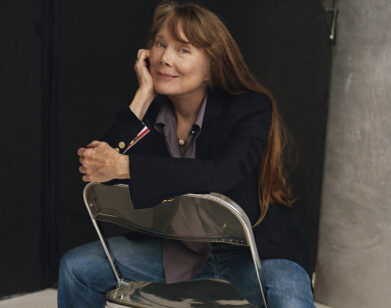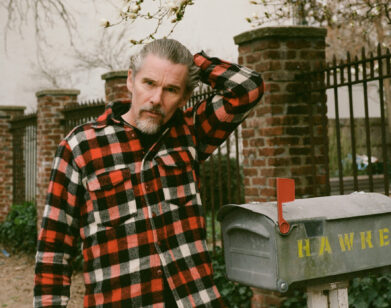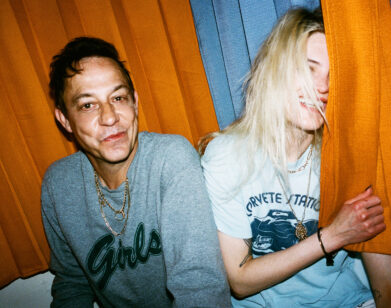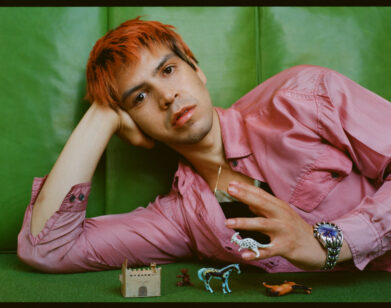IN CONVERSATION
Maya Hawke Tells Margaret Qualley Why She’s Not Your Manic Pixie Dream Girl
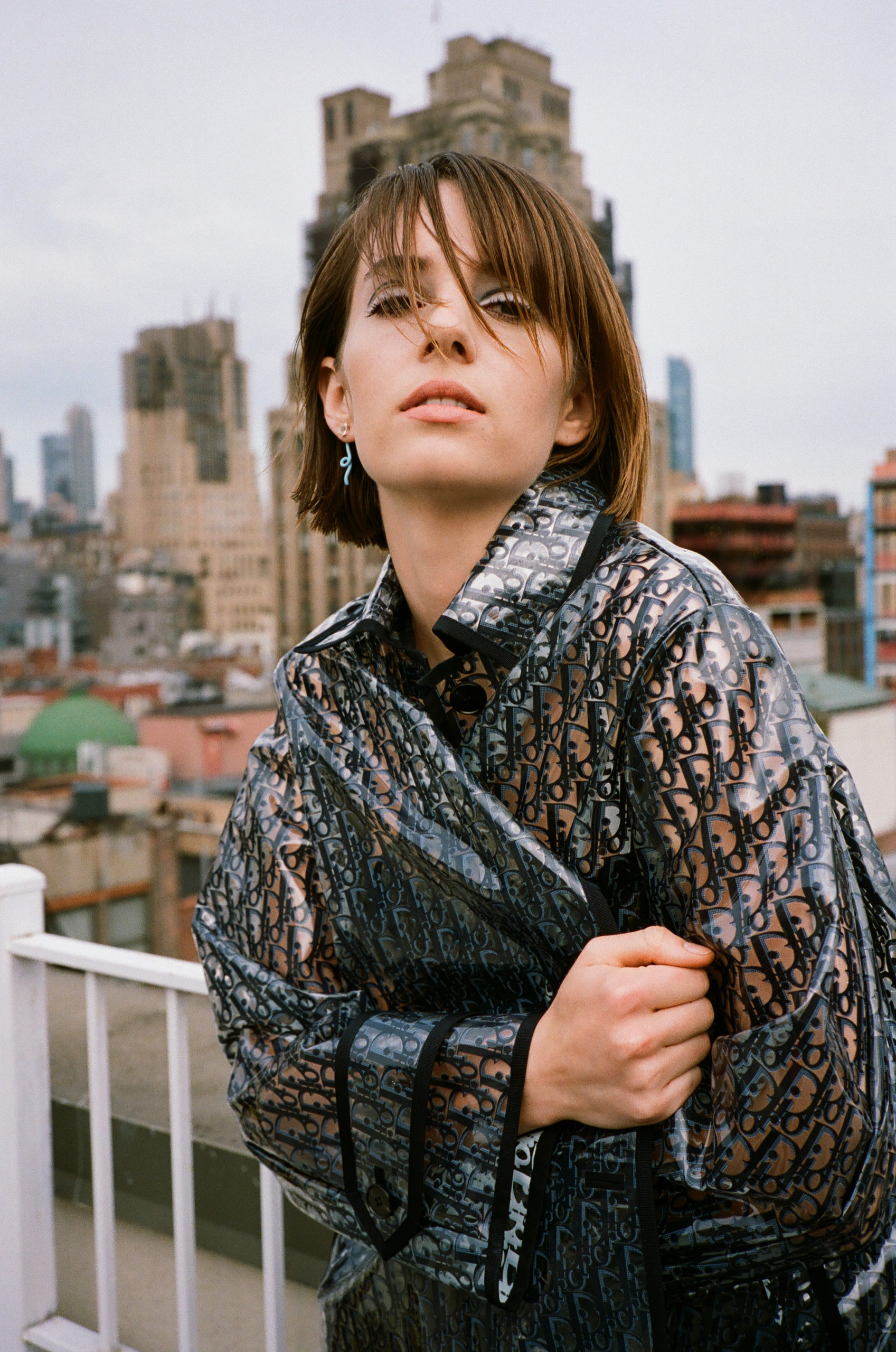
Jacket, Top, Briefs, Socks, and Shoes by Dior. Earrings by Bea Bongiasca. Rings by Mejuri.
It’s fitting that Maya Hawke’s first acting gig was the role of Jo March in the 2017 BBC adaption of Little Women. Like Jo, she’s bold, ambitious, and never at a lack for words, even as she insists that inside, she has “this little, tiny, weak, vulnerable lizard that I protect with my little lion’s shell.” It’s that side of her that the 22-year-old Stranger Things actor—and daughter of ’90s Hollywood heartthrobs Uma Thurman and Ethan Hawke—had a chance to flex in her latest film, Mainstream, directed by Gia Coppola, another talent with cinema in her DNA. Alongside young actors (Andrew Garfield, Alexa Demie, Nat Wolff, Charles Melton) and YouTubers (Jake Paul, Juanpa Zurita) alike, Hawke shines in a social media satire that paints a dark portrait of the internet’s cult of personality. Below, she chats with Margaret Qualley, her friend and Once Upon a Time… in Hollywood co-star, about working with women, taking up space, and modeling as a “bundle of limbs.” —SARAH NECHAMKIN
———
MARGARET QUALLEY: Hi, Maya.
MAYA HAWKE: Hello, Margaret. Nice to see you.
QUALLEY: So you’re in the middle of recording an album right now.
HAWKE: Yeah, I mean, it wasn’t going to be an album. It was my bass player, who played in the band that I had when I did my first record, who asked me to send him some lyrics, and I was like, “Okay.” I decided to send him the most complicated, weird poem that I possibly could. He just did something amazing. And then I sent him a couple more, and we had these three really complicated strange things. And then Christian Lee Hutson, who is an unbelievable writer, got involved. And I sent him some poems, and he sent me back some unbelievable songs. And then Will, who is one of my best friends in the whole world, and he and I just like, “We’re both going to come to be pinch hitters.” We wrote a song. And then when we got to our Airbnb, we wrote a song. And then the next night, we wrote a song. And then all of a sudden, we had an album. So it happened very, very spontaneously. But it’s my favorite thing I’ve ever done in my life.
QUALLEY: That’s incredible. Congratulations. I am your number one fan.
HAWKE: Thank you.
QUALLEY: So, the thing that I’m here to talk about is your exceptional performance in the movie that you did with Gia Coppola titled Mainstream. I’m tempted to just blow through my favorite moments, but before I do that, I should ask you, how did this movie come together?
HAWKE: Very simple, in a certain way. I was a big fan of Gia for a long time, mostly because of Palo Alto. When I saw that movie, I hadn’t seen somebody look at our generation with such an empathetic eye. I hadn’t seen someone look at the way that we interact with technology and the way we interact with each other, and actually see the intimacy that was really going on and not just the depersonalized, tech, Gen Z, Millennial person.
QUALLEY: I know exactly what you mean. Gia had such an empathetic and romantic view of the high school experience. And, obviously, it’s my best performance of my life.
HAWKE: Exactly. It was the first thing I saw you in.
QUALLEY: I’m in it for 30 seconds.
HAWKE: So then I wanted a general meeting with her, and we met, and I think that I did not make a good first impression. Because I knew that she was working on the script for Mainstream, and this was six years ago, and I never heard anything about it for two more years.
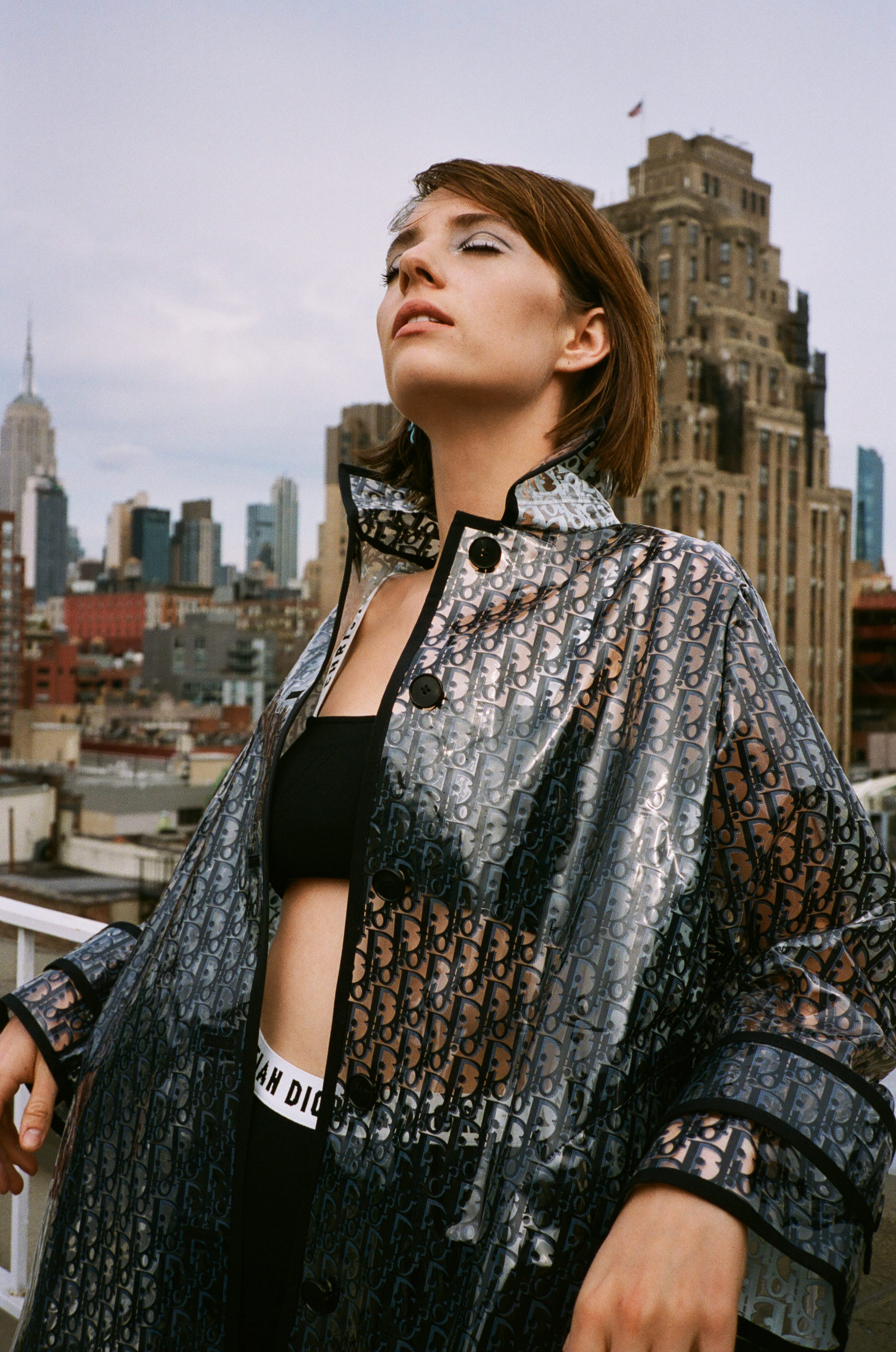
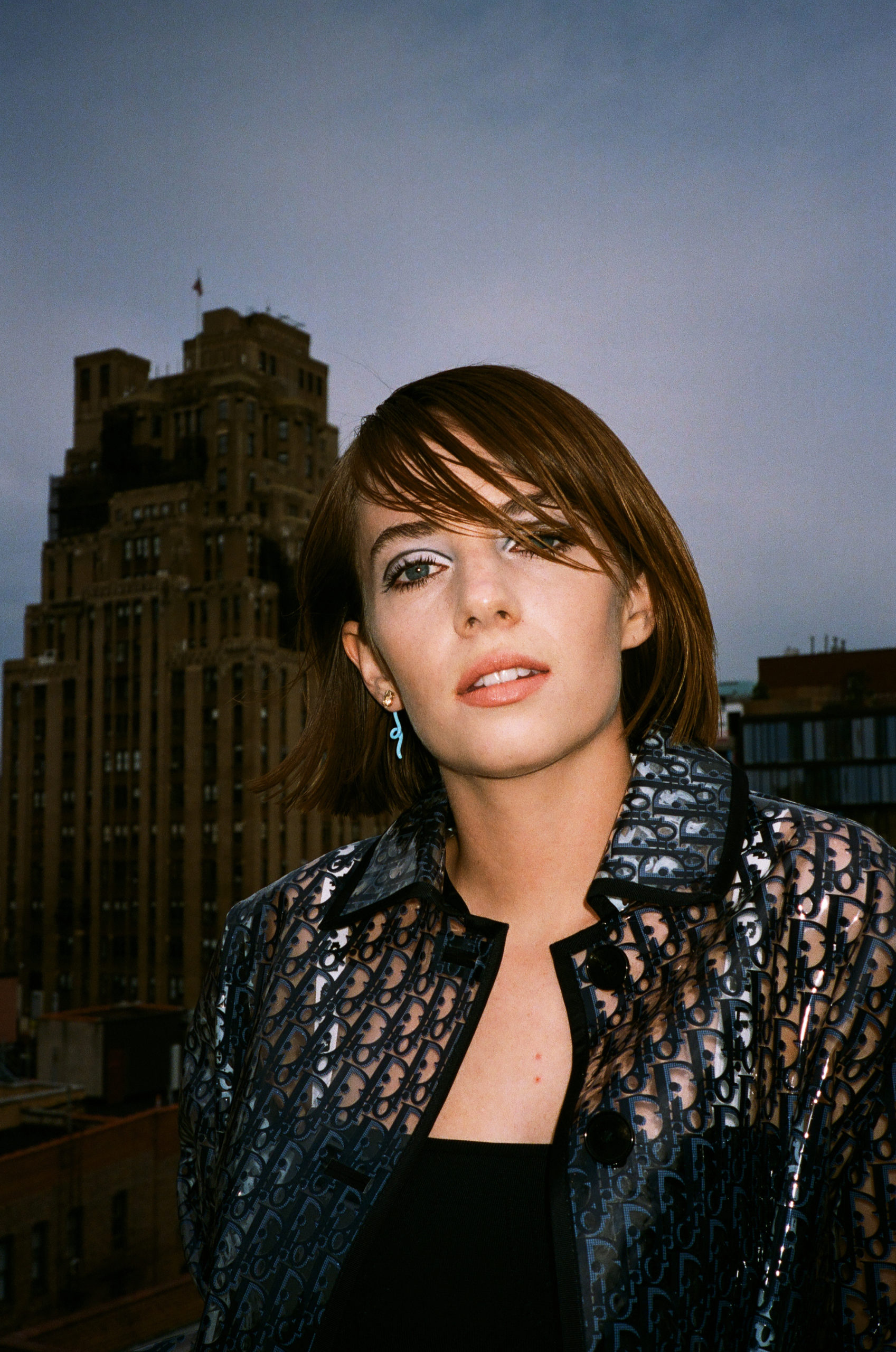
QUALLEY: I’m going to go ahead and call bullshit there because you’re the star of the movie. So what are you talking about?
HAWKE: Well, something else happened. I, apparently, made a bad first impression. And then I worked with Zac Posen. She did a photoshoot for Zac Posen, and I was the model. The way that she took pictures, I just felt like she actually was looking at me as a person and not me in the clothes, or me as someone who could look conventional, but my whole awkward bundle of limbs. And I was like, “Oh shoot. If she can make me feel this looking at me through a camera, god, I’d kill to work with her on a moving image.” I was willing to be awkward and dumb and a bundle of limbs. And then she asked me to come to a reading of a script. We read the whole script.
QUALLEY: So it was a table read.
HAWKE: Right. It was a table read, not an audition. But it was an audition of a table read. I was the only person in the room who did not know they had the job.
QUALLEY: Oh, that’s so terrible. Terrible and great at the same time.
HAWKE: Yeah, it was awful. And then it was a year of working on the script, doing rehearsals, different writing sessions, different talking on the phone, sending references, studying the fricking internet, which I still don’t know anything about. And then we filmed it in a mad dash of a month. So that’s how it came to be.
QUALLEY: What was it like working with Gia?
HAWKE: I did 10 interviews yesterday, so I got this story fucking down. Gia is really amazing. She is so not power-hungry. She knows that she’s going to be in the edit in the end of the day, and she would give so much space for everyone to feel like they’re in control and to feel like they have creative agency and they have the right to make the thing that they want to make. She was just this beautiful little elfish, warrior queen who is in the corner, being like, “Yeah, do that. If you don’t mind, just do this on this other take, just so I have it.” She was building everyone’s performances in the most gentle way. She has such a warm way. And also, my job was really fricking easy, because I was working alongside Andrew [Garfield], who really helped me create that character. She’s really different than me. She’s a super muted person. The way that my social anxiety and my introversion exercise themselves is through creating a false extroverted personality, like sort of a gregarious shell that seems impenetrable and fun and outspoken. And then I have this little, tiny, weak, vulnerable, lizard inside of me that I protect with my little lion’s shell.
QUALLEY: Oh my god.
HAWKE: But this movie made me bring the lizard out. And Andrew helped just suck up all the lion energy in the room because he had to be this great big lion. It was great.
QUALLEY: You are closer to the Maya that I know in your scenes with Nat [Wolff], I would say. And perhaps that’s because he gave you more room.
HAWKE: Yes. Exactly. Nat made such space to be like, “No, I see you. I see your bigness.” Both, for me as Maya, and also for the character. He was like, “I want you to be big, and I want you to fill the room.” And I think Frankie’s journey and her rejection of him is like, “I don’t want to fill the room. I want to be crushed. I want to be stepped on. I don’t want to be big. And I resent you for even thinking that I’m big because I think I’m so small.” And then by the end of the story, she’s like, “Okay, I guess I’m going to pull my hair back and embrace myself and go try to be big somewhere.” I think that’s really the core of what the movie is about.
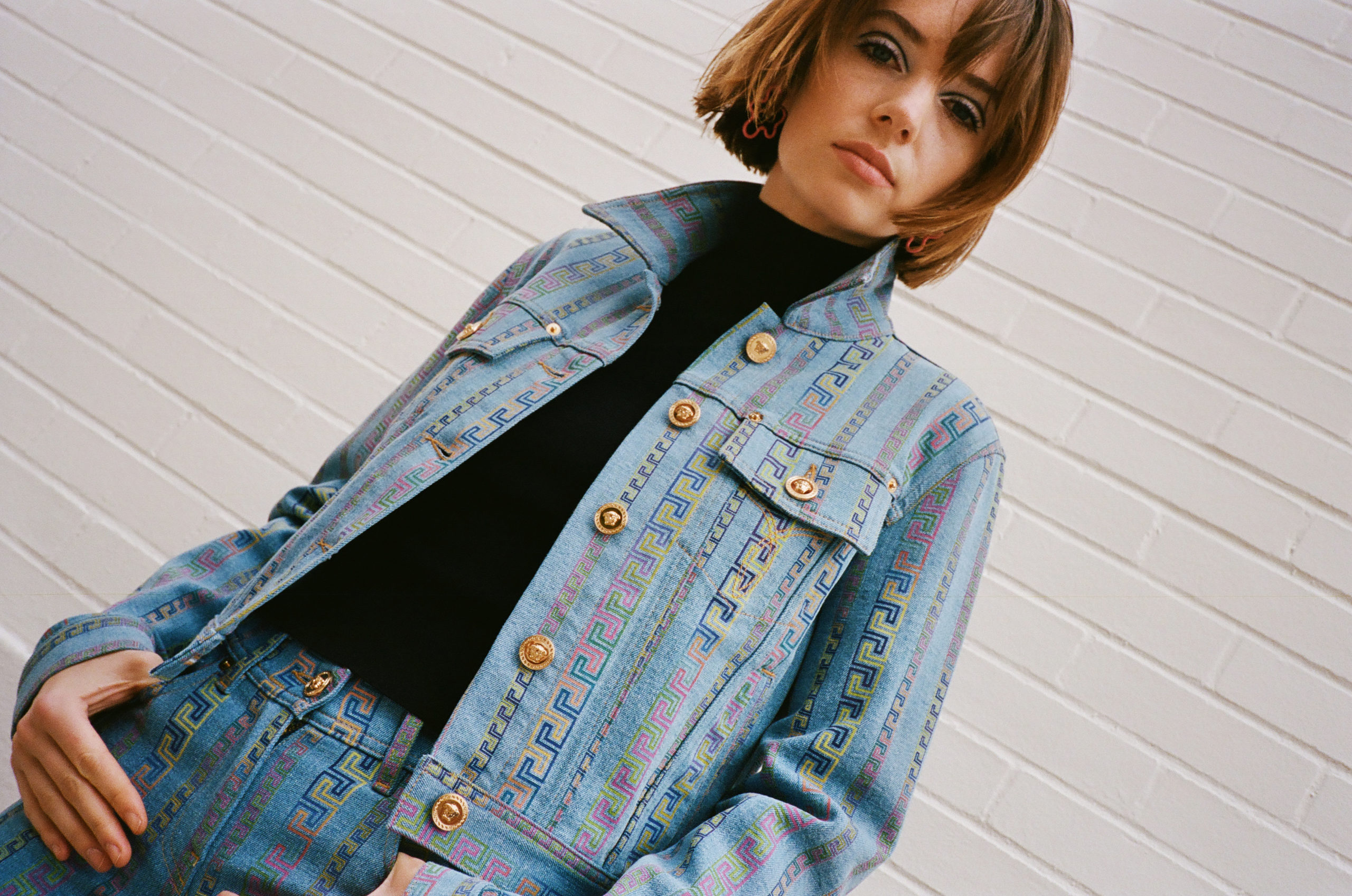
Jacket, Turtleneck and Jeans by Versace. Earrings by Bea Bongiasca. Rings by Mejuri. Shoes by Kwaidan Editions.
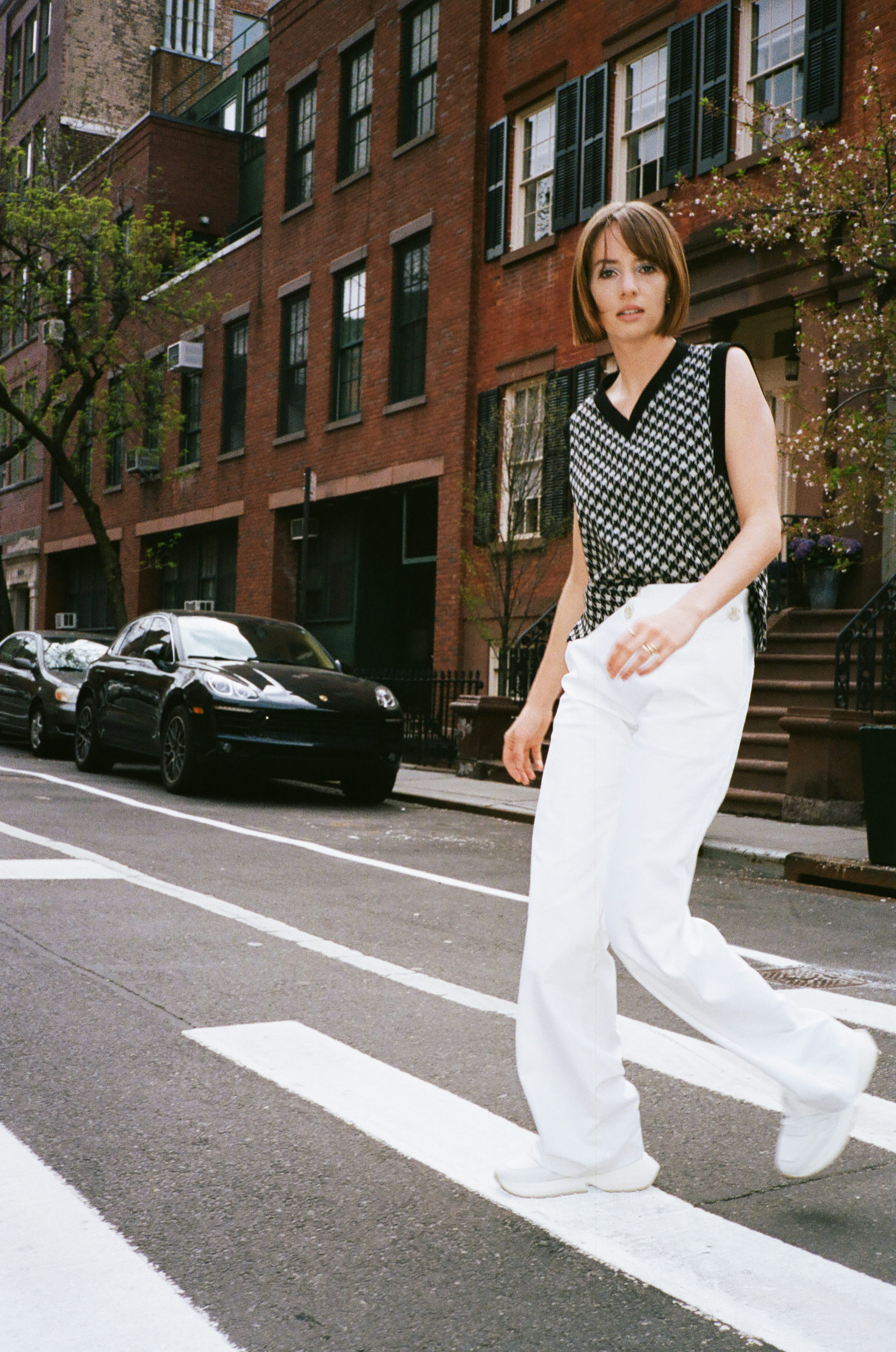
Top and Pants by Rosetta Getty. Earrings by Of Rare Origin. Rings by Katkim and Wwake. Shoes by Stuart Weitzman.
QUALLEY: That’s very well said and very beautiful. I’m going to now just flip through my favorite little bits, okay? You write Andrew a note, and you say, “I’m putting it in your shoe,” and you tuck the note in his shoe. It was such a nice, sweet little moment. And I was like, “This is either a genius script moment, or it was just a sweet Maya moment.” I couldn’t tell the difference. And I am curious.
HAWKE: It was a sweet Maya moment. I mean, it’s been a long time since we filmed the movie, and I remember exactly what you’re talking about. What Gia was so amazing about was giving you a lot of lead room. The movie ended up being different than I thought it was going to be. But what I was really interested and excited about was telling a love story. I read the script, and in the same way that Frankie was, I was confused.
QUALLEY: I do that with everything I’ve ever done. I always think that everything is a drama. I’m always completely off about tone. And then I don’t realize what movie I’m supposed to be living in until I see it. And then I was like, “Oh, shit. I really would have done things differently.”
HAWKE: Yeah, I have no idea. I always think everything is drama or romance. I’m always like, “I had no idea that it was a political commentary.”
QUALLEY: I’m just far too earnest.
HAWKE: Me too. I’m always like, “Oh, this is love.” I wanted to tell a love story, but I think so did Frankie. She wanted it to be a love story. And so I kept trying to embed these little moments of intimacy into the movie and being like, “Oh, I would do this. I would touch her arm in this way. I would build this moment. I would put this note here.” And I think that, for me at least, that’s one of my favorite things about the movie. I feel like Frankie is fighting for the story to be a different story than the one that she’s in, which is what I feel like I’ve done in every relationship I’ve ever been in in my whole life.
QUALLEY: Ditto. Hindsight’s 2020.
HAWKE: My glasses work so good when I look back into the past.
QUALLEY: I felt the same way about the moment when Andrew’s character covers your eyes on the bicycle and then pretty quickly removes them after realizing how scary it is. It seemed like a genuine moment of like, “Oh, fuck.” And then trying to play it off like he wasn’t scared, which actually made it all the more entertaining, because in character he’s trying to kind of mask that, “Oh, that was terrifying.” I want to know how that happened.
HAWKE: You’re so smart and you’re such a good movie-watcher. These are the best questions I’ve ever been asked. I think there’s audio taken out of that moment of Andrew putting his hands over my eyes, and me going, “Take them off, take them off, take them off. I can’t see.” I had to overdub that with something being like, “Ha, ha, ha, ha.” That was a very authentic moment. I don’t know if you’ve had this experience, but I feel like every time I have to ride a bike in a movie, everyone’s like, “Can you ride a bike?” And I’m always like, “Of course I can ride a bike.” And then they give me the bike and I’m like, “Ah, I don’t know if I can ride this thing.”
QUALLEY: I liked that, though. I also just wanted to say that the way that you move through a room, Maya, is so captivating. You have this little moment with Nat and you puncture your exit with your little beer bottle and you kind of strut out and you’re just so lovable and charming. It’s just an absolute pleasure to watch you.
HAWKE: Thank you.
QUALLEY: Okay, more things. When you confide in Andrew’s character about your dad, it just really hurt because he comforts you with this kiss and I can feel your sadness. And it’s so sucky, exposing yourself to a crush that way and getting this return that is supposed to be comforting, but really it’s not because he isn’t really looking out for you. It’s all about him. I could feel all of that from you in that moment.
HAWKE: You know, it’s something I’ve noticed a lot in moments where I personally go out for comfort and receive back sexuality. I really don’t like it.
QUALLEY: I don’t like it at all. I’m like, “Wait. No, no, no. I just said something really personal and really vulnerable and now you’re just kissing me and that’s not enough.”
HAWKE: I hate makeup sex. I don’t like it. You can trust me. I will come at you with sexuality if that’s what I want. If it’s not obvious, it’s not happening. And so I think that moment was really important to me, these moments where people really don’t understand each other, and it’s like someone’s playing chess and someone else is playing checkers. And you’re just like, “King me” and someone else is like, “Fucking checkmate.” And you’re just like, “Whoa.”
QUALLEY: Absolutely.
HAWKE: I hate talking about gender differences because they’re so random and stupid, but in my experience, men can often put sexuality as a Band-Aid over whatever wound is going on. Some wounds require casts and some require stitches. Will you just properly assess the medical situation before you apply dressings to the wound?
QUALLEY: I could not agree more. That was one of my favorite moments in the film. Gia shot it so beautifully.
HAWKE: I totally agree. And Autumn [Durald], the DP, was so amazing.
QUALLEY: Oh, I was going to ask if it was Autumn. I love her. The combo of them—they’re so feminine and powerful at the same time, not that those ever would be going against each other.
HAWKE: No, but it does. You’ll go to see an all-female Shakespeare production or something, which is so awesome, but so often the way in which women try to be powerful is by impersonating men.
QUALLEY: You don’t have to wear a pantsuit in order to be taken seriously.
HAWKE: You don’t have to sit with your legs separated to be taken seriously. That’s an option, and if that works for you, that’s a great option.
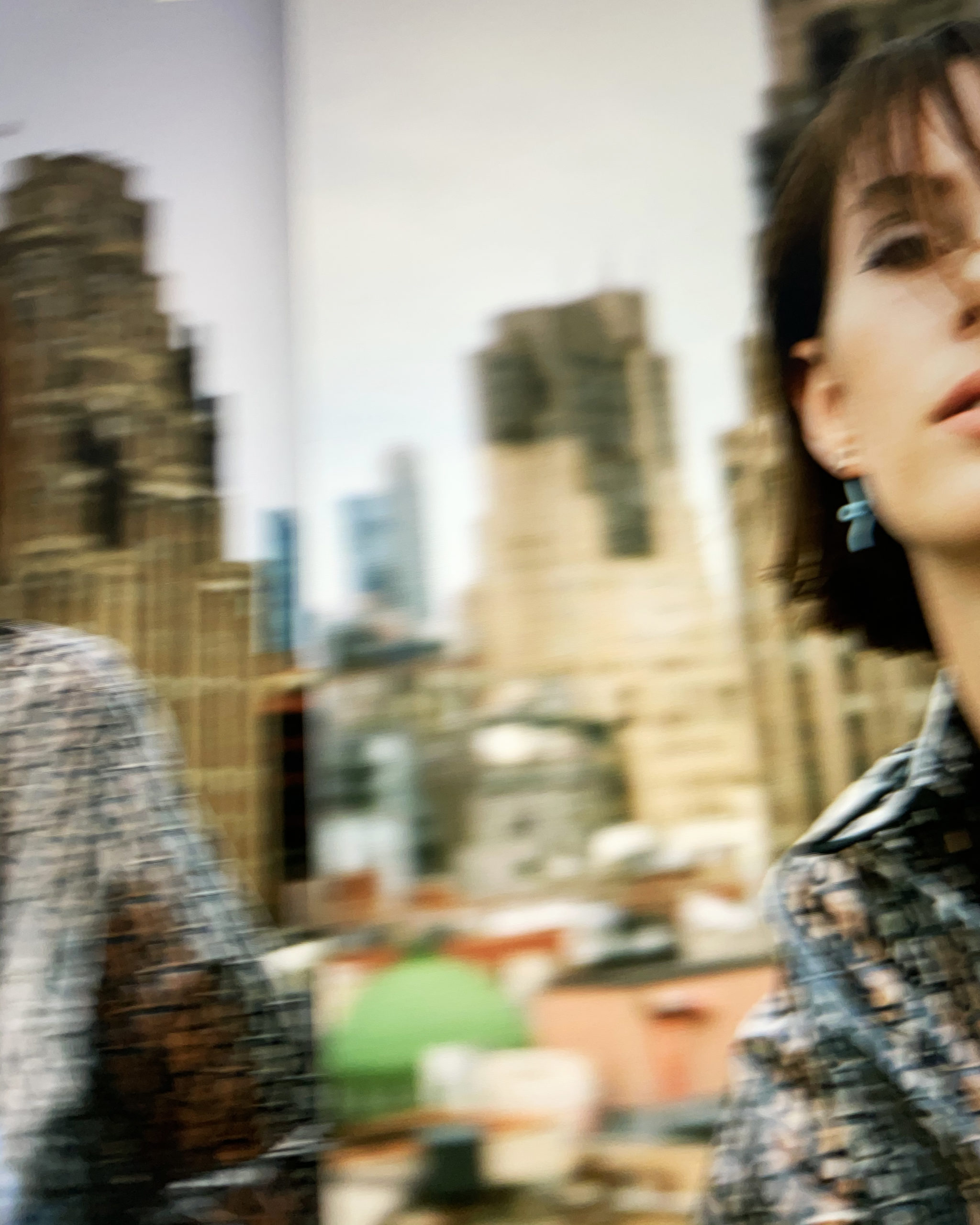
QUALLEY: You can be the cultural definition of what was considered femininity in the ’50s, and still be powerful.
HAWKE: For me, to have a female DP and a female director is a really amazing experience because you can go to the darkest place. And obviously, everybody is different and maybe it’s not even female, maybe it’s just those two people, but having those two people as your DP and your director made me feel so safe. The story could get as dangerous as it wanted to, and as an actor, I still felt safe.
QUALLEY: Because they were your guardian angels and they’re also both very special, special, talented artists.
HAWKE: Yes, exactly.
QUALLEY: If you could have anybody see this film and have a nice conversation with them about it, who would it be?
HAWKE: Other than Taylor Swift?
QUALLEY: No. Honestly, Taylor Swift is a fine answer.
HAWKE: I think Taylor Swift is a really good answer, and not just because she’s on my t-Shirt. One thing I love about this movie is that I feel like it flips the ‘manic pixie dream girl’ idea on its head because Andrew is playing a manic pixie dream boy and Frankie gets to be this subtle and slightly downtrodden and empathetic hero. He has to do all the work to make the moment special. And I’m so sick, in my own life and in movies, for all the women to have to do all the work to make the moment special, for them to have to peacock around and look so beautiful. Gia didn’t make me have to do that. I just got to be myself. And I’m excited to have a movie out there that has that flip, especially where gender is getting so interesting and complicated and inspiring. I feel so fluid in my own gender. I love getting dressed up and being sparkly and peacocking around, and I also love not doing that. And that kind of ease that I got to have in that movie is the ease I felt Taylor having with Folklore and Evermore. It felt like she was like, “I’m going to be my fricking self. I can put my hair up and have the album cover be a picture of the back of my head. And that’s all I need. You don’t need me to smile. All you need from me is this music that I made that I love.”
QUALLEY: Ultimately, this conversation is really just about Taylor Swift. Taylor, we love you.
HAWKE: Ultimately, every conversation I have is actually about Taylor Swift. Taylor, I love you. And if I could pick one other person to talk to this movie about, it would be Taylor.
———
Hair: Gianpaolo Cecilliato using Dior Beauty at Tracey Mattingly Agency
Makeup: Peter Butler at Tracey Mattingly

